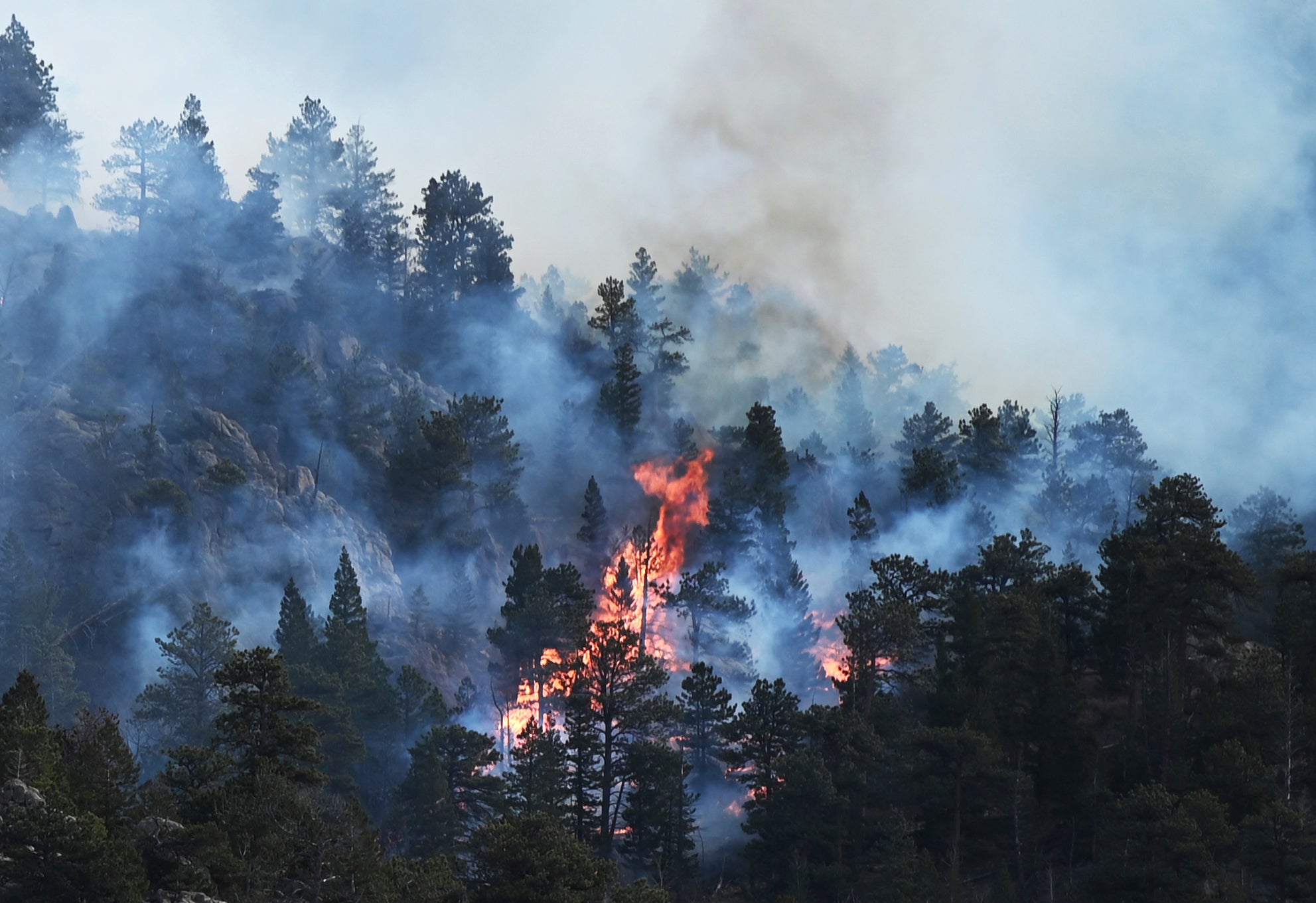Wind-stoked wildfire causes death in Wyoming, evacuations
Wildfires pushed by strong winds have forced evacuations of homes in Montana, Wyoming and Colorado and led to a death in Wyoming

Your support helps us to tell the story
From reproductive rights to climate change to Big Tech, The Independent is on the ground when the story is developing. Whether it's investigating the financials of Elon Musk's pro-Trump PAC or producing our latest documentary, 'The A Word', which shines a light on the American women fighting for reproductive rights, we know how important it is to parse out the facts from the messaging.
At such a critical moment in US history, we need reporters on the ground. Your donation allows us to keep sending journalists to speak to both sides of the story.
The Independent is trusted by Americans across the entire political spectrum. And unlike many other quality news outlets, we choose not to lock Americans out of our reporting and analysis with paywalls. We believe quality journalism should be available to everyone, paid for by those who can afford it.
Your support makes all the difference.Wildfires pushed by strong winds forced the evacuation of homes in Montana Wyoming and Colorado and led to a death in Wyoming, officials said Tuesday.
Downed power lines caused a fire near the northern Wyoming community of Clark on Monday night that burned at least two homes and seven outbuildings, said Jerry Parker, the Park County Fire District administrator. Wind gusts topped 100 mph (161 kph) in the area Monday night.
Kristie Hoffert, medical chief for the Clark Fire District, said the person who died was a family member of a firefighter.
“It hits incredibly close to home for our department,” she told The Cody Enterprise on Tuesday. “We are struggling.”
Officials did not release any information on how the death occurred.
Clark resident James Hayes told the newspaper that he was forced to flee his home at about 1 a.m. Tuesday, shortly before the fire encircled it. He returned later Tuesday to find his property mostly unscathed, he said.
The fire burned about half a square mile (1.4 square kilometers) of land, Parker said.
In south-central Montana, a fire reported at about 11:30 p.m. Monday led the Stillwater County Sheriff's Office to order evacuations southwest of the town of Absarokee, including an area between the communities of Ingersoll and Roscoe.
Thirty-five evacuation notices were issued and deputies also went door-to-door, but it's not clear how many people left their residences, the sheriff's office said. The cause of the fire is still under investigation.
“Right now, we’ve got firefighters, engines and dozers working to get ahead of the fire,” Absarokee Volunteer Fire Rescue Department Chief Amanda Ferster told The Billings Gazette. There have been no reports of injuries or major structures destroyed, she said.
The fire had burned an estimated 6 square miles (16 square kilometers) in timber and rough terrain by Tuesday afternoon. Rain fell on the area Tuesday morning, but the wind increased the fire activity in the afternoon, said Tammie Mullikin, a spokesperson for the Stillwater County Sheriff's Office.
In north-central Colorado, a fire southeast of Estes Park forced evacuations in a forested region of Larimer County while sending plumes of smoke toward the eastern plains.
The fire was first reported about 7 a.m. in rugged terrain and triggered evacuations in the Hermit Park and Little Valley areas near Estes Park and, later, southward to the Boulder County line and east of U.S. Highway 36 between Estes Park and Lyons. The blaze grew to 115 acres (47 hectares), the Larimer County Sheriff’s Office said.
The cause of the fire was unknown.
Winds gusting to 45 mph (73 kph) fanned the fire slowly eastward. Steep terrain of pine and scrub brush made it difficult for local fire crews to gain access. Officials reported 11% containment Tuesday afternoon.
County officials had no immediate reports of structures being damaged. It wasn’t immediately known how many people received evacuation notices, said sheriff’s Deputy Chris Smith
The National Weather Service in Boulder said an approaching cold front could bring higher wind gusts to the area late Tuesday but lower temperatures just above freezing on Wednesday.
A historic drought and recent heat waves tied to climate change have made wildfires harder to fight in the American West. Scientists say climate change has made the region much warmer and drier in the past 30 years and will continue to make weather more extreme and wildfires more frequent and destructive.